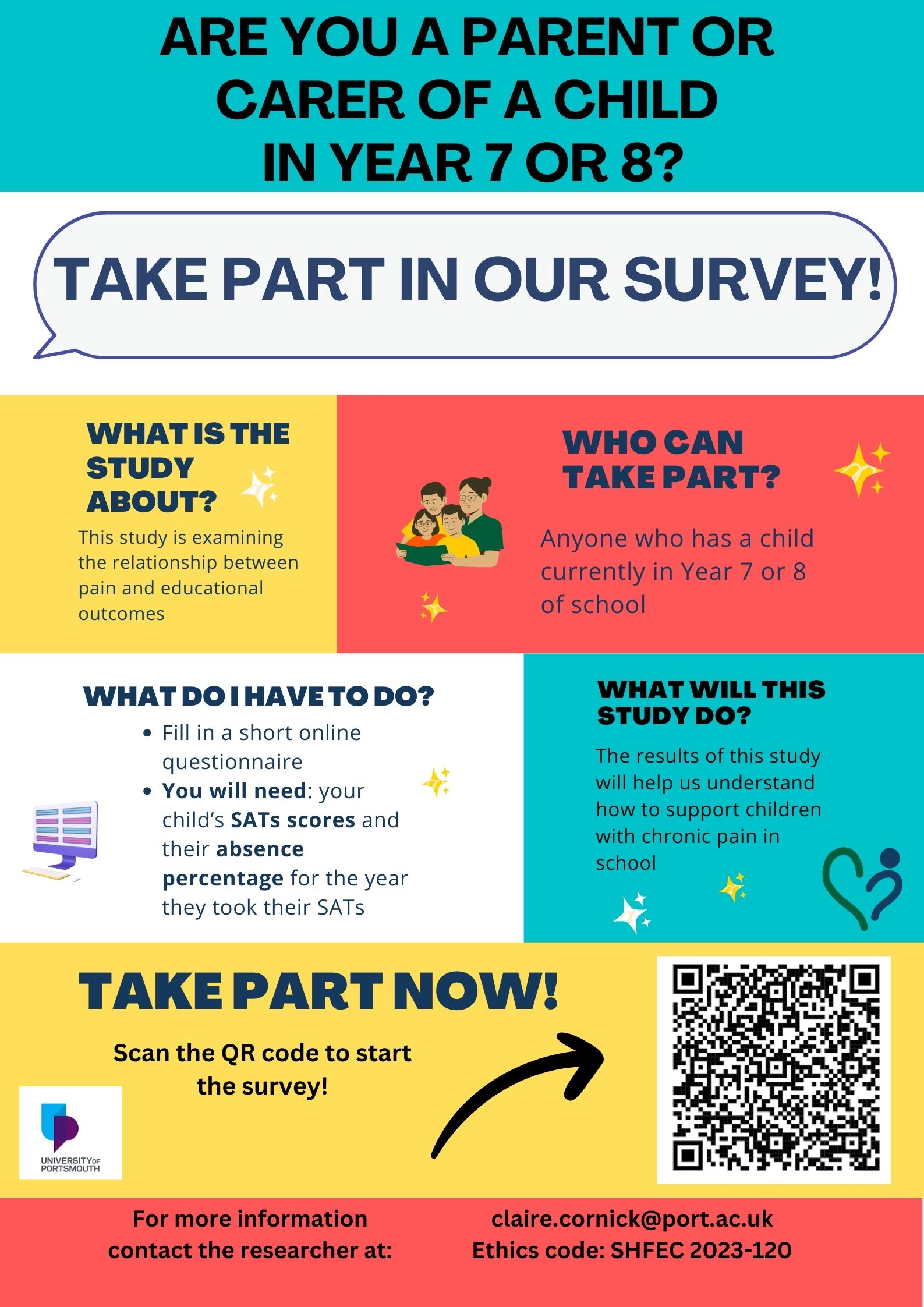We use cookies to improve your experience. By accepting you agree to our cookie policy

Chronic pain in children is often an invisible condition and is commonly misunderstood by others. The complexity of how pain presents in children, and the ambiguity of pain diagnoses, often means children and families feel unsupported by those around them. Additionally, the lack of training for teachers on what chronic pain is and how it affects children in the classroom, means children with chronic pain are likely not receiving the support they need in school. This study is part of a larger PhD project which aims to understand the relationship between chronic pain and school performance for children in England, and how teachers might be able to better support children in the classroom.
 Research in other countries has shown that chronic pain can have substantial impacts on school performance for children. Areas affected can be overall grade achievements, attendance levels, and friendships. However, in the UK, there is very little research about the relationship between chronic pain and school performance; this means children living with chronic pain in England may not be receiving the right support in schools to help them achieve their full potential. This study aims to address that lack of evidence by examining if there is a relationship between chronic pain and achievement on the Standardised Assessment Tests (SATs) children in state schools in England sit in Year 6. The scores for children with and without chronic pain will be compared to see if there is a difference. These tests have been chosen as all children in the same school year sit the same standardised tests, meaning comparison is more reliable. If the study shows there is a difference in the achievement of scores for the SATs, the results of this study can be used to inform further research on how to help teachers support children at school to achieve the same as their peers. Attendance rates will also be compared between children with and without chronic pain to see if there is a difference. Research in other countries shows that children with chronic pain are absent more often than children without chronic pain. If a difference is shown in this study, the results can be used to inform future research to understand what can be done to support children getting into school more, which in turn could help their academic achievement improve. Lastly, emotional wellbeing will also be looked at. Research has shown children with chronic pain often suffer from poor mental health and more negative peer friendships. There may be many underlying reasons for this, and if the emotional wellbeing of children with chronic pain is demonstrated to be poorer than their peers in this current study, the results may be used to train teachers in the best way to support children in school.
Research in other countries has shown that chronic pain can have substantial impacts on school performance for children. Areas affected can be overall grade achievements, attendance levels, and friendships. However, in the UK, there is very little research about the relationship between chronic pain and school performance; this means children living with chronic pain in England may not be receiving the right support in schools to help them achieve their full potential. This study aims to address that lack of evidence by examining if there is a relationship between chronic pain and achievement on the Standardised Assessment Tests (SATs) children in state schools in England sit in Year 6. The scores for children with and without chronic pain will be compared to see if there is a difference. These tests have been chosen as all children in the same school year sit the same standardised tests, meaning comparison is more reliable. If the study shows there is a difference in the achievement of scores for the SATs, the results of this study can be used to inform further research on how to help teachers support children at school to achieve the same as their peers. Attendance rates will also be compared between children with and without chronic pain to see if there is a difference. Research in other countries shows that children with chronic pain are absent more often than children without chronic pain. If a difference is shown in this study, the results can be used to inform future research to understand what can be done to support children getting into school more, which in turn could help their academic achievement improve. Lastly, emotional wellbeing will also be looked at. Research has shown children with chronic pain often suffer from poor mental health and more negative peer friendships. There may be many underlying reasons for this, and if the emotional wellbeing of children with chronic pain is demonstrated to be poorer than their peers in this current study, the results may be used to train teachers in the best way to support children in school.
This study is the first of its kind to use Standardised Assessment Tests as a measure of school achievement, and the first research in England to compare outcomes between children both with and without chronic pain. It is hoped the results of this study will inform the next part of the PhD research which aims to understand teachers’ and school personnels’ experiences and perceptions of chronic pain, and what they feel they might need in order to appropriately support children with chronic pain in their classrooms. Children with chronic pain should be able to achieve their full potential, and with the support of researchers and schools, it is hoped this is an achievable goal.
Who can participate?
Recruitment is open to anyone who has a child currently in Year 7 or 8 of school.
Interested?
For more information and to participate in this research study, follow this link: https://research.sc/participant/login/dynamic/6D496460-A4CF-4CB8-8EC4-98BB9EE0F586
We use cookies to improve your experience. By accepting you agree to our cookie policy
 £
£